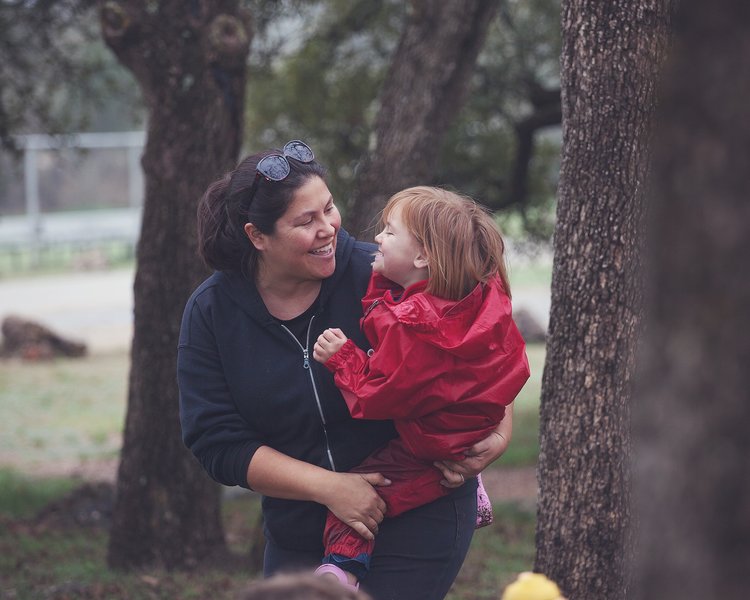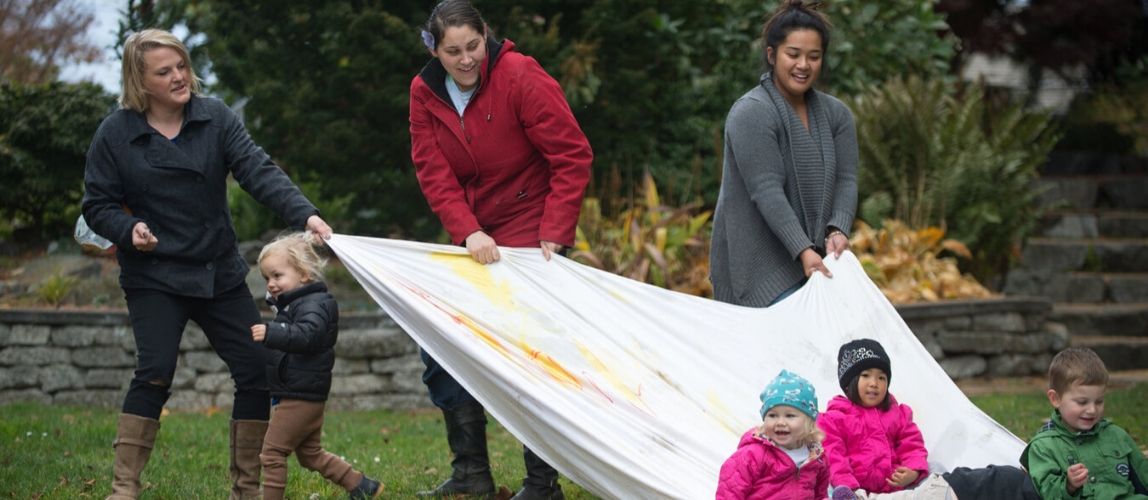
I’m just coming back down to Earth after this year’s LEGO Idea Conference, a wildly inspiring 3-day convening of 400 people from around the world who research, make policy, and innovate with a shared commitment to the power of play in children’s development. Focused on “Unlocking the Power of Parenting,” this year’s sessions focused on understanding the contexts in which people around the world parent and identifying tools that can help parents unlock their superpowers.
This thoughtful and global conversation made one thing clear: the human drive to parent is powerful, and parenting is universally hard. The current context in which humans parent varies dramatically around the world. However, we all struggle to find the time we need, feel pressure to gather the resources we believe our children will need in the future, and struggle to feel that we are ever doing enough.
In our culture, dwindling social supports and increasingly stretched familial networks leave us feeling isolated and overwhelmed. Many of us also struggle to feel that our system of schooling matches the big dreams we have for our kids. And, new comprehensive research about parents as consumers of early education shows us that “parents of all races and socioeconomic status overwhelmingly identify a capable, well-rounded child as the ultimate goal for early education.” Will the system help us produce this? It’s clear that not all families can count on that. How will we be able to fill in the gaps for our own kiddos?
Parents have power.
At the same time, we have tremendous power as parents. Our power over the system will come through banding together and pushing on it—and that is an important post for another day. Right now, on our own, we have the power to alter the lives of our own children. No one else can play the role that parent or primary caregiver can play in a young child’s life—no one. Even if another person has more knowledge or more strategies than you do, your child still sees you as their primary teacher—it’s how children are wired.
And, the good news is, we’re wired to deliver on that as parents. Simple as that.
"Genetically, infants are wired to learn and their parents are wired to help them.” —Ann Lewin-Benham
Unlocking our parent power
How can we unlock the power of parenting? One word: play. Play with our children whenever we can, and give them a world in which they have loads of chances to play.
Children are driven and designed to learn through play.
“When given the opportunity, children of all ages, including infants, spontaneously engage in play.” —Harvard Center on the Developing Child
Science tells us that it is through play that children develop the social and emotional, physical and cognitive skills they need to learn, thrive and be ready for an ever changing future. We can lean into that by spending some of our time playing with kids while we also give kids loads of opportunities to play with peers and on their own. We make decisions that dictate how our kiddos spend their time, and we can decide for more play.
“Nearly all developmental psychologists, neuroscientists and education experts recommend play for kids 0-7 as the best way to nurture kids’ development and ready them for success later in life.”—Scientific American
When we are directly involved in play with our children, we elevate the importance of play in their minds. We can also model important skills quite naturally as we play—skills like creativity, empathy, persistence and problem solving. Learning done during play sessions will make an extra strong mark on our children’s minds and on their hearts because it is us parents who are playing.
Building responsive relationships
When we join children in their world of play, we also have the chance to make our relationships with our children more responsive. Known by experts as “serve and return,” the healthy give and take that we can have with kids through responsive play is proven to form healthy circuitry in the brain. Plus, if we engage in responsive play often enough, the serve and return behaviors carry over from play sessions into other interactions with our children.
The good news is, both parents and kids are designed for serve and return—it comes naturally once you try it. Next time you play, notice how your child responds when you slow down, get on their level, look them in the eye and really listen to their ideas. Respond to their ideas with inquiry, suggestions or conversation. See how the serves and returns flow back and forth. Then, notice how much more you are able to glimpse into what your child thinks, knows and can imagine. Maybe you already do all of this, and if so, bask in it next time you play. If not, it is never too late to start.
What do we mean by play?
More good news—there is no one “right” way to play. It’s just important to be responsive, follow your child’s lead and focus on the process. At Tinkergarten, we’ve used research to define the kind of play that helps kids develop a breadth of skills. Our definition has six key characteristics:

-
PLAY IS PLEASURABLE. If it’s not fun, it’s not play.
-
PLAY IS INTRINSICALLY MOTIVATED. Children engage in play simply for the satisfaction the experience itself brings.
-
PLAY IS PROCESS ORIENTED not product oriented.
-
PLAY IS FREELY CHOSEN. It is spontaneous and voluntary. Although adults create environments that support children’s play, play is initiated and sustained by the child.
-
PLAY IS ACTIVELY ENGAGED. Players must be physically and/or mentally involved in the activity. Engagement can take many forms.
-
PLAY IS NON-LITERAL. It involves make-believe.
Krasnor & Pepler, 1980; Rubin, Fein, & Vandenberg, 1983
In any given play session with kids, things may stray a bit along one of these dimensions, but we use this definition as a north star, adjusting our approach in order to support these six important criteria as much as we can.
We also ask ourselves how the play environments and experiences in our home lives or in the play lessons we create for Tinkergarten can better support this definition of play. Aiming for this north star has helped us create transformative play experiences for our own kids, ourselves, as well as kids, parents and caregivers in the program.
Play opportunities are everywhere
Once you start to apply these characteristics, play can take place in the context of all kinds of day to day activities. Nothing in the research states that play requires expensive or specialized toys. In fact, play is more creative with fewer, open-ended play objects. When we take simple objects and add a little pretending or playfulness, we teach kids to be imaginative, and we show them that their world is full of possibilities.
Hand over a bowl and a few ingredients and welcome your child to make his own “dish” as you whip up dinner. Stop along the way to pay attention to how they are doing it and show your interest in their process. Pretend together that you are your child’s favorite creature as you make your way to the store, tidy up your home or hang out in the park. Stay curious and keep learning about how kids develop—chances to support that development through play will continue to appear as you do.
But, it’s hard to find time to play!
The other good news is, the quality of the time we spend is even more impactful than the quantity of time. Periodic high quality play sessions with parents benefit kids and help them develop a breadth of skills.
So, we needn’t be crushed beneath the guilt when we spend time away from our kiddos. And, for those of us who care for our kids full time, we don’t have to become our children’s constant playmates. In fact, that’s counterproductive to their becoming independent, self-driven learners, and it is terribly draining to us. Instead, we need to engage and enjoy the play when we can make the time.
We deserve support
Research shows that parents benefit from support with facilitating play. Want ideas and support? Search for simple play starters and easy invitations to play that you can extend to your kids. Sign up for regular, well designed playful learning experiences for you and your child. Find a community of families with whom you and your children can be playful.
Remember, it’s good for you, too!
Research also tells us that we adults need to play. When we play, we experience a reduction in stress and increased happiness and well being. If we turn off the expectations that we are supposed to play in any certain way, tune out the outside world, and just connect directly with our kids, play is mindfulness. In a world of constant distraction and demand from the world around us, this is life saving for mental health. Fight for this time, whenever you can grab it.
Play with kiddos may not quite be the spa, but, in a world where self care feels hard to come by, we can get a few birds with one stone when we play with our kids: help our children develop; enjoy some of the inherent benefits of play; and feel a bit of the weight of parenting lifted.
Big cheers
Please come back and comment if you have a great play experience with your kids. No matter what you do next, though, let’s all slow down and snuggle our kids tonight. I can’t wait to get home to mine and feel the magic in each hug—that is the real power, and we’ve got a lifetime supply of it. Cheers to all of us for that!
